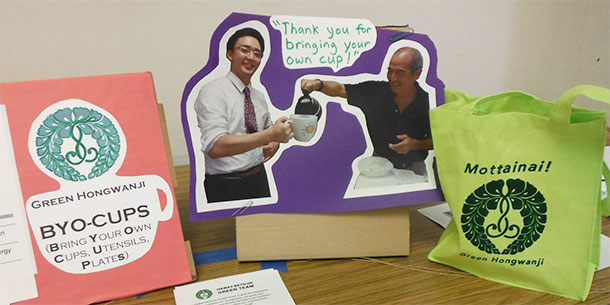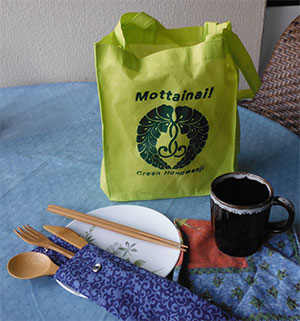Buddhist teachings of interconnectedness help us understand that, even though we say ‘throw away,’ there really is no ‘away.’ A new waste-reduction program at Hawaii Betsuin is making it a little bit easier for members to align their actions with this understanding.
 Encouraged by Honpa Hongwanji Mission of Hawaii’s Green Hongwanji Initiative, the Betsuin has launched a program to encourage the use of reusable cups and other items at temple events. The effort is known as BYO-CUPS, short for “bring your own cups, plates, and utensils,” with an initial focus on reducing the number of styrofoam cups used at fellowship time after Sunday services.
Encouraged by Honpa Hongwanji Mission of Hawaii’s Green Hongwanji Initiative, the Betsuin has launched a program to encourage the use of reusable cups and other items at temple events. The effort is known as BYO-CUPS, short for “bring your own cups, plates, and utensils,” with an initial focus on reducing the number of styrofoam cups used at fellowship time after Sunday services.
“It’s a start,” said David Atcheson, convener of the Betsuin’s Green Team. “Some temple members had already begun to bring their own plastic or ceramic cups on Sundays. We’re giving that trend a boost.”

Example of a complete BYO-CUPS kit. The bamboo utensils and holder are from Kailua Hongwanji.
The goal of the program is to begin reducing both waste and the temple’s carbon footprint. A 2013 study by Trinity College in Dublin, Ireland entitled, “Lifecycle Assessment: Reusable Mugs vs. Disposable Cups,” estimated that using a ceramic mug over its assumed lifetime of 500 uses produces only 2% of the C02-equivalent emissions of using 500 styrofoam cups. Using a reusable plastic cup saves even more emissions. The study factored in the energy used to make, transport, and wash the cups.
What about providing and washing reusable cups at the temple? “We did consider that,” said Atcheson. “One factor is there is no dishwasher in the temple kitchen and we wanted to be mindful about creating new volunteer tasks.” He also noted that if members get into the habit of bringing their own cups and utensils to church, they can easily start bringing them to non-temple events too. The temple does plan to have some reusable mugs on hand for guests and those who may forget their mugs at home.
“We’ll excited to see how it goes,” said Atcheson. “The response so far has been great and we’ll do a full evaluation after six months” when the initial phase of the program ends.


